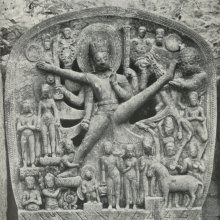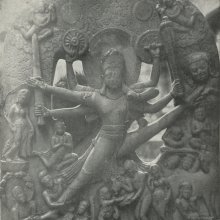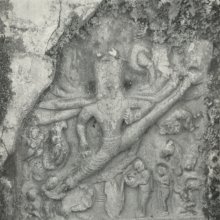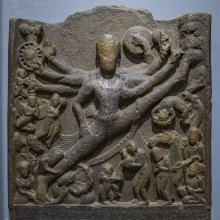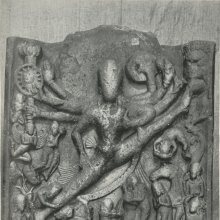Vikranta, Vikrānta, Vikrāntā, Vikramta: 18 definitions
Introduction:
Vikranta means something in Buddhism, Pali, Hinduism, Sanskrit, biology. If you want to know the exact meaning, history, etymology or English translation of this term then check out the descriptions on this page. Add your comment or reference to a book if you want to contribute to this summary article.
Images (photo gallery)
In Hinduism
Purana and Itihasa (epic history)
Source: archive.org: Puranic EncyclopediaVikrānta (विक्रान्त).—A King who was the father of Sudhṛti and the son of King Dama. It is mentioned in Vāyu Purāṇa, Chapter 86, that Vikrānta was an ideal King who loved and cared for his subjects.
Source: Cologne Digital Sanskrit Dictionaries: The Purana Index1a) Vikrānta (विक्रान्त).—A Prajāpati;1 famous for originating the Vāleya Gandharvas.2
1b) A son of Dama: a king who increased the welfare of his kingdom; father of Sudhṛti.*
- * Vāyu-purāṇa 86. 13.
1c) A son of Bheda.*
- * Vāyu-purāṇa 99. 196.
1d) (Satyahita): a son of Puṣpavān.*
- * Vāyu-purāṇa 99. 224.
2) Vikrāntā (विक्रान्ता).—One of the Vidyādhara gaṇas.*
- * Vāyu-purāṇa 69. 29.
Vikrānta (विक्रान्त) is a name mentioned in the Mahābhārata (cf. VIII.4.36) and represents one of the many proper names used for people and places. Note: The Mahābhārata (mentioning Vikrānta) is a Sanskrit epic poem consisting of 100,000 ślokas (metrical verses) and is over 2000 years old.

The Purana (पुराण, purāṇas) refers to Sanskrit literature preserving ancient India’s vast cultural history, including historical legends, religious ceremonies, various arts and sciences. The eighteen mahapuranas total over 400,000 shlokas (metrical couplets) and date to at least several centuries BCE.
Natyashastra (theatrics and dramaturgy)
Source: Wisdom Library: Nāṭya-śāstra1) Vikrānta (विक्रान्त) refers to one of the ten kinds of yamaka, according to Nāṭyaśāstra chapter 17. Yamaka is one of the four “figures of speech” (alaṃkāra), used when composing dramatic compositions (kāvya).
2) Vikrānta (विक्रान्त) is the name of a meter described in the Nāṭyaśāstra chapter 32:—“the metre which has in its feet of twelves syllables the first nine and the last long, is vikrāntā”.

Natyashastra (नाट्यशास्त्र, nāṭyaśāstra) refers to both the ancient Indian tradition (shastra) of performing arts, (natya—theatrics, drama, dance, music), as well as the name of a Sanskrit work dealing with these subjects. It also teaches the rules for composing Dramatic plays (nataka), construction and performance of Theater, and Poetic works (kavya).
Vyakarana (Sanskrit grammar)
Source: Wikisource: A dictionary of Sanskrit grammarVikrānta (विक्रान्त).—Name given to a samdhi where the visarga remains intact although it can , optionally be changed into a sibilant consonant; e.g. यः ककुभः, यः पञ्च, यो वः शिवतमो रसः। (yaḥ kakubhaḥ, yaḥ pañca, yo vaḥ śivatamo rasaḥ|) cf। विक्रान्तसंधिस्तु प्राकृतेपधो वेदितव्यो यत्र विसर्गः श्रूयेत (| vikrāntasaṃdhistu prākṛtepadho veditavyo yatra visargaḥ śrūyeta) R.Pr.IV.11.

Vyakarana (व्याकरण, vyākaraṇa) refers to Sanskrit grammar and represents one of the six additional sciences (vedanga) to be studied along with the Vedas. Vyakarana concerns itself with the rules of Sanskrit grammar and linguistic analysis in order to establish the correct context of words and sentences.
Ayurveda (science of life)
Nighantu (Synonyms and Characteristics of Drugs and technical terms)
Source: WorldCat: Rāj nighaṇṭu1) Vikrāntā (विक्रान्ता) is another name for Vatsādanī, a medicinal plant identified with Cocculus hirsutus (broom creeper or ink berry) from the Menispermaceae or “moonseed” family of flowering plants, according to verse 3.102-104 of the 13th-century Raj Nighantu or Rājanighaṇṭu. The third chapter (guḍūcyādi-varga) of this book contains climbers and creepers (vīrudh). Together with the names Vikrāntā and Vatsādanī, there are a total of six Sanskrit synonyms identified for this plant.
2) Vikrāntā (विक्रान्ता) is also mentioned as a synonym for Jayantī, a medicinal plant possibly identified with Sesbania sesban (Linn.) Merr. (or ‘Egyptian riverhemp’), according to verse 4.131-132. The fourth chapter (śatāhvādi-varga) of this book enumerates eighty varieties of small plants (pṛthu-kṣupa). Note: Bāpālāl accepting the Sesbania species, suggests differently as Sesbania aegyptiaca Pers. of Papilionaceae sub order. Together with the names Vikrāntā and Jayantī, there are a total of sixteen Sanskrit synonyms identified for this plant.
3) Vikrāntā (विक्रान्ता) is also mentioned as a synonym for Ādityabhaktā, a medicinal plant, possibly identified with Helianthus annuus Linn. or “common sunflower” from the Asteraceae or “daisy” family of flowering plants, according to verse 4.179-181. Together with the names Viśrāntā (Vikrāntā) and Ādityabhaktā, there are a total of eighteen Sanskrit synonyms identified for this plant.
4) Vikrāntā (विक्रान्ता) is also mentioned as a synonym for Viṣṇukrāntā, an unidentified medicinal plant, according to verse 5.89. The fifth chapter (parpaṭādi-varga) of this book enumerates sixty varieties of smaller plants (kṣudra-kṣupa). Together with the names Vikrāntā and Viṣṇukrāntā, there are a total of eight Sanskrit synonyms identified for this plant.
5) Vikrāntā (विक्रान्ता) is also mentioned as a synonym for Haṃsapādī, a medicinal plant possibly identified with Adiantum lunulatum Burm. from the Pteridaceae family of flowering plants, according to verse 5.109-113. Together with the names Vikrāntā and Haṃsapādī, there are a total of twenty-six Sanskrit synonyms identified for this plant. Note: Haṃsapādī is claimed as a variety of Lajjālu by Dh. and Rājanighaṇṭu.
6) Vikrāntā (विक्रान्ता) is another name for Dravantī an unidentified medicinal plant, possibly identified with either (1) Jaipal—Croton tiglium, (2) Baliospermum sinuatum Muell or (3) Ratanjota—Jatropha glandulifera Roxb., according to verse 5.134-136. Together with the names Vikrāntā and Dravantī, there are a total of fifteen Sanskrit synonyms identified for this plant.
Veterinary Medicine (The study and treatment of Animals)
Source: Shodhganga: Portrayal of Animal Kingdom (Tiryaks) in Epics An Analytical studyVikrānta (विक्रान्त) (lit. “one who is courageons, bold strong and victorious ”) is a synonym (another name) for the Lion (Siṃha), according to scientific texts such as the Mṛgapakṣiśāstra (Mriga-pakshi-shastra) or “the ancient Indian science of animals and birds” by Hamsadeva, containing the varieties and descriptions of the animals and birds seen in the Sanskrit Epics such as the Ramayana and Mahabharata.

Āyurveda (आयुर्वेद, ayurveda) is a branch of Indian science dealing with medicine, herbalism, taxology, anatomy, surgery, alchemy and related topics. Traditional practice of Āyurveda in ancient India dates back to at least the first millenium BC. Literature is commonly written in Sanskrit using various poetic metres.
In Buddhism
Tibetan Buddhism (Vajrayana or tantric Buddhism)
Source: WikiPedia: Tibetan BuddhismVikrānta (विक्रान्त) (in Tibetan: Nampar Nön) (1727–1827 CE) refers to the nineteenth of the twenty-five Kalki kings (of Shambhala) who represents the holders of the Kalachakra (“wheel of time”) teachings of Buddha Shakyamuni.—The king Vikrānta is described as “subduer of the mass of foes, the inner and outer classes of devils”.

Tibetan Buddhism includes schools such as Nyingma, Kadampa, Kagyu and Gelug. Their primary canon of literature is divided in two broad categories: The Kangyur, which consists of Buddha’s words, and the Tengyur, which includes commentaries from various sources. Esotericism and tantra techniques (vajrayāna) are collected indepently.
Biology (plants and animals)
Source: Google Books: CRC World Dictionary (Regional names)1) Vikranta in India is the name of a plant defined with Adiantum lunulatum in various botanical sources. This page contains potential references in Ayurveda, modern medicine, and other folk traditions or local practices It has the synonym Adiantum lunulatum Houtt. (among others).
2) Vikranta is also identified with Cleome viscosa It has the synonym Sinapistrum viscosum (L.) Moench (etc.).
3) Vikranta is also identified with Didymochlaena truncatula It has the synonym Adiantum philippense L. (etc.).
Example references for further research on medicinal uses or toxicity (see latin names for full list):
· Journal of Botany (1841)
· Prodromus Florae Peninsulae Indiae Orientalis (1834)
· Phytomedicine (2002)
· Contributions from the United States National Herbarium (1974)
· Suppl. Meth. (Moench) (1802)
· Bulletin of Miscellaneous Information Kew (1897)
If you are looking for specific details regarding Vikranta, for example side effects, chemical composition, health benefits, diet and recipes, pregnancy safety, extract dosage, have a look at these references.

This sections includes definitions from the five kingdoms of living things: Animals, Plants, Fungi, Protists and Monera. It will include both the official binomial nomenclature (scientific names usually in Latin) as well as regional spellings and variants.
Languages of India and abroad
Sanskrit dictionary
Source: DDSA: The practical Sanskrit-English dictionaryVikrānta (विक्रान्त).—p. p.
1) Stepped or passed beyond.
2) Powerful, heroic, valiant, chivalrous; युधामन्युश्च विक्रान्तः (yudhāmanyuśca vikrāntaḥ) Bhagavadgītā (Bombay) 1.6; Kirātārjunīya 16.2.
3) Victorious, overpowering (one's enemies).
-ntaḥ 1 A hero, warrior.
2) A lion.
3) Name of a kind of संधि (saṃdhi) which leaves विसर्ग (visarga) unchanged.
-ntam 1 A pace, stride; तद्विक्रान्तैर्विजितानीह त्रीणि (tadvikrāntairvijitānīha trīṇi) Mahābhārata (Bombay) 13.158.2.
2) Heroism, valour, prowess.
3) The jewel called वैक्रान्त (vaikrānta).
4) A kind of intoxicating drink.
Source: Cologne Digital Sanskrit Dictionaries: Shabda-Sagara Sanskrit-English DictionaryVikrānta (विक्रान्त).—mfn.
(-ntaḥ-ntā-ntaṃ) 1. Valiant, mighty. 2. Overcoming victorious. m.
(-ntaḥ) 1. A hero, a warrior. 2. A lion. n.
(-ntaṃ) 1. Valour. 2. A step, a stride. E. vi before, kram to go, aff. kta, in an active sense.
Source: Cologne Digital Sanskrit Dictionaries: Cappeller Sanskrit-English DictionaryVikrānta (विक्रान्त).—[adjective] bold, valiant; [neuter] = vikrama.
Source: Cologne Digital Sanskrit Dictionaries: Monier-Williams Sanskrit-English Dictionary1) Vikrānta (विक्रान्त):—[=vi-krānta] [from vi-kram] a mfn. stepped beyond, taking wide strides etc.
2) [v.s. ...] courageous, bold, strong, mighty, victorious (with dhanuṣi, skilled in archery), [Mahābhārata]
3) [v.s. ...] m. a warrior, [cf. Lexicographers, esp. such as amarasiṃha, halāyudha, hemacandra, etc.]
4) [v.s. ...] a lion, [cf. Lexicographers, esp. such as amarasiṃha, halāyudha, hemacandra, etc.]
5) [v.s. ...] ‘passed over’, Name of a kind of Saṃdhi which leaves Visarga unchanged, [Ṛgveda-prātiśākhya]
6) [v.s. ...] Name of a Prajā-pati, [Viṣṇu-purāṇa]
7) [v.s. ...] of a son of Kuvalayāśva and Madālasā, [Mārkaṇḍeya-purāṇa]
8) Vikrāntā (विक्रान्ता):—[=vi-krāntā] [from vi-krānta > vi-kram] f. Name of various plants (Cocculus Cordifolius, Clitoria Ternatea, Cissus Pedata etc.), [cf. Lexicographers, esp. such as amarasiṃha, halāyudha, hemacandra, etc.]
9) Vikrānta (विक्रान्त):—[=vi-krānta] [from vi-kram] n. a step, stride, [Vājasaneyi-saṃhitā; Taittirīya-brāhmaṇa]
10) [v.s. ...] manner of walking, gait, [Mahābhārata; Rāmāyaṇa]
11) [v.s. ...] bold advance, courage, might, [ib.]
12) [v.s. ...] a sham diamond, [cf. Lexicographers, esp. such as amarasiṃha, halāyudha, hemacandra, etc.]
13) [v.s. ...] a kind of intoxicating drink, [cf. Lexicographers, esp. such as amarasiṃha, halāyudha, hemacandra, etc.]
14) [=vi-krānta] b etc. See p. 955, col. 3.
Source: Cologne Digital Sanskrit Dictionaries: Yates Sanskrit-English DictionaryVikrānta (विक्रान्त):—[vi-krānta] (ntaḥ) 1. m. A hero; a lion. n. Valour. a. Valiant, victorious.
Source: DDSA: Paia-sadda-mahannavo; a comprehensive Prakrit Hindi dictionary (S)Vikrānta (विक्रान्त) in the Sanskrit language is related to the Prakrit word: Vikkaṃta.
[Sanskrit to German]
Sanskrit, also spelled संस्कृतम् (saṃskṛtam), is an ancient language of India commonly seen as the grandmother of the Indo-European language family (even English!). Closely allied with Prakrit and Pali, Sanskrit is more exhaustive in both grammar and terms and has the most extensive collection of literature in the world, greatly surpassing its sister-languages Greek and Latin.
Kannada-English dictionary
Source: Alar: Kannada-English corpusVikrāṃta (ವಿಕ್ರಾಂತ):—
1) [adjective] stepped out or beyond.
2) [adjective] taking wide strides.
3) [adjective] courageous; bold; strong; mighty.
--- OR ---
Vikrāṃta (ವಿಕ್ರಾಂತ):—
1) [noun] a bold, courageous, valorous man.
2) [noun] courage; boldness; valour.
3) [noun] the act or a course of walking.
Kannada is a Dravidian language (as opposed to the Indo-European language family) mainly spoken in the southwestern region of India.
Nepali dictionary
Source: unoes: Nepali-English DictionaryVikrānta (विक्रान्त):—adj. 1. victorious; 2. courageous; valiant; 3. mighty;
Nepali is the primary language of the Nepalese people counting almost 20 million native speakers. The country of Nepal is situated in the Himalaya mountain range to the north of India.
See also (Relevant definitions)
Starts with: Vikrantabhima, Vikrantadevagati, Vikrantagamin, Vikrantagati, Vikrantamukha, Vikrantaplutam, Vikrantashudraka, Vikrantayamaka, Vikrantayodhin.
Ends with: Abhishuvikranta, Adityakavikranta, Avikranta, Bhimavikranta, Dorvikramta, Kshinavikranta, Simhavikranta, Suryavikranta, Suvikranta.
Full-text (+41): Bhimavikranta, Kshinavikranta, Simhavikranta, Suvikranta, Vaikranta, Hamsavikrantagamita, Avikranta, Vikrantabhima, Vikrantayodhin, Simhavikrantagamin, Vikrantashudraka, Simhavikrantagamita, Vikrantayamaka, Vikrantagati, Vikramta, Vikkirantam, Nagavikrantagamita, Vayikkirantam, Vidyadharagana, Vikrantamukha.
Relevant text
Search found 23 books and stories containing Vikranta, Vi-kranta, Vi-krānta, Vi-krāntā, Vikramta, Vikrāṃta, Vikrānta, Vikrāntā; (plurals include: Vikrantas, krantas, krāntas, krāntās, Vikramtas, Vikrāṃtas, Vikrāntas, Vikrāntās). You can also click to the full overview containing English textual excerpts. Below are direct links for the most relevant articles:
Shrimad Bhagavad-gita (by Narayana Gosvami)
Verses 1.4-6 < [Chapter 1 - Sainya-Darśana (Observing the Armies)]
Bhakti-rasamrta-sindhu (by Śrīla Rūpa Gosvāmī)
Verse 3.3.75 < [Part 3 - Fraternal Devotion (sakhya-rasa)]
The Skanda Purana (by G. V. Tagare)
Chapter 66 - Jalpeśvara (jalpa-īśvara-liṅga) < [Section 2 - Caturaśīti-liṅga-māhātmya]
Chapter 33 - Ānandeśvara (ānanda-īśvara-liṅga) < [Section 2 - Caturaśīti-liṅga-māhātmya]
Jivanandana of Anandaraya Makhin (Study) (by G. D. Jayalakshmi)
Analysis of Goddess Parameśvarī < [Chapter 6 - Dramatic aspects of the Jīvanandana Nāṭaka]
Analysis of Adbhuta-rasa < [Chapter 6 - Dramatic aspects of the Jīvanandana Nāṭaka]
The Markandeya Purana (by Frederick Eden Pargiter)
Canto XXV - The story of Kuvalayāśva and Madālasā (continued)
Canto LXXVI - The Sixth Manvantara
Canto XXVI - The story of Kuvalayāśva (continued): The Education of his Sons
List of Mahabharata people and places (by Laxman Burdak)
